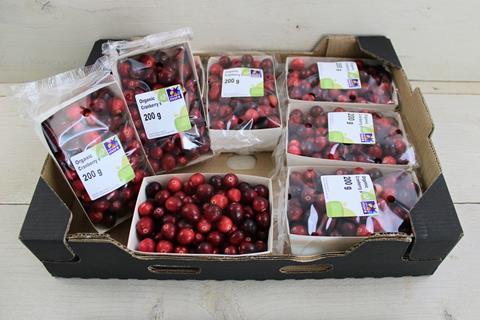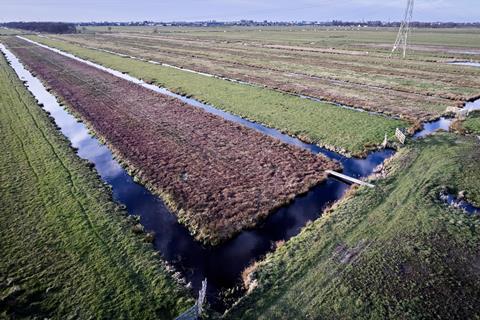Dutch organic specialist’s cranberry programme offers climate-positive solution for vulnerable peatlands while delivering high-quality fruit with extended shelf-life through innovative dry-harvesting methods

Leading organic fresh produce specialist Eosta has heralded the start and continuing expansion of its organic cranberry programme.
According to the Dutch group, the programme has proven successful in helping tackle some of The Netherlands’ biggest environmental challenges linked to dairy farming in vulnerable peatlands.
Beginning in early November and running through to late December, Eosta will have cranberries available from The Cranberry Company, which grows the fruit on 18 hectares of peat soil in The Netherlands’ Krimpenerwaard region.
”It may be intrinsically linked with the festive season, but the fruit is increasingly in demand across Europe and beyond, with large volumes being exported to organic and speciality food shops in Germany, plus the UK organic grocery chain Able & Cole,” Eosta stated.
However, The Cranberry Company’s biggest impact has arguably been closer to home, and it has been as much a result of the grower’s pioneering production methods as the products themselves.
Grown in wet peatlands where decades of dairy farming have caused soil degradation, water loss, and placed already low-lying areas under increased threat from rising sea levels, The Cranberry Company has shown that replacing cattle with cranberries is not only environmentally beneficial, but is also economically viable.
In areas where dairy farming is becoming increasingly problematic, cranberry cultivation provides a climate-positive alternative for wet peatlands where keeping the soil wet is essential to helping reduce CO2 emissions due to peat oxidation, prevent soil subsidence, and stimulating biodiversity.
But, more than this, the production methods being used by The Cranberry Company help ensure a better quality product with a long shelf-life, Eosta explained.
Rich in antioxidants and vitamins, the 100 per cent organically-grown cranberries are dry-harvested rather than the common ‘wet harvesting method,’ which involves flooding fields and shaking berries loose.

According to The Cranberry Company’s Matthijs Crouwers, this approach results in firm, flavourful berries with consistently high quality, and a longer shelf-life than wet-harvested berries.
“We’ve been underway almost ten years, growing in peatlands where soil substance is a big problem,” said Crouwers.
”We are located in an area two-three meters below sea level, and draining the peatlands for diary farming causes the level of the land to fall even further.
“We need to re-wet the peatlands, and we have found we can grow cranberries on them,” he outlined.
”But we don’t just grow organic cranberries, it’s also related to peat restoration, soil substance, combating climate change, and helping biodiversity.”
Supported from Eosta from its initial harvests, Crouwers said The Cranberry Company had been expanding production every year, and is now confident of being able to supply all the cranberries Eosta will sell during the current season.
“These are great quality berries with excellent shelf life that enables us to overcome some of the storage issues associated with cranberries,” said Casper Velthuijs, Eosta’s product manager for cranberries.
“From a sustainability point of view, this is also a valuable product because oxidising peat landscapes is a major issue, and they have found a solution for it.”



